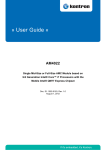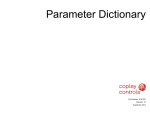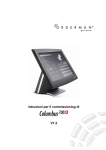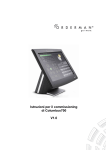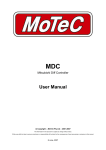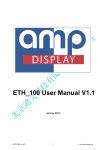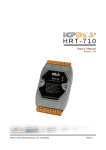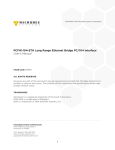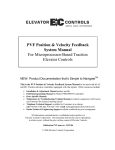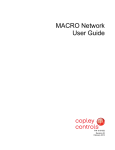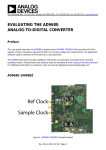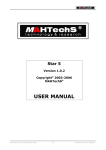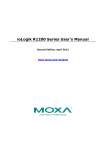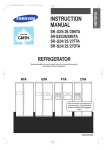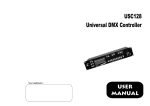Download User`s Manual - ICP DAS USA`s I
Transcript
TM HRT-711 User’s Manual Version 1.00 Revision History Revision Date Description 1.00 2014/01/21 First revision Preface Warranty All products manufactured by ICP DAS are under warranty regarding defective materials for a period of one year from the date of delivery to the original purchaser. Warning ICP DAS assumes no liability for damages resulting from the use of this product. ICP DAS reserves the right to change this manual at any time without notice. The information furnished by ICP DAS is believed to be accurate and reliable. However, no responsibility is assumed by ICP DAS for its use, nor for any infringements of patents or other rights of third parties resulting from its use. Copyright Copyright © 2013 by ICP DAS CO., LTD. All rights are reserved. Trademark Names are used for identification purposes only and may be registered trademarks of their respective companies Table of Contents SECTION 1- INTRODUCTION ....................................................................................................................... 7 1.1 FEATURES...................................................................................................................................................... 7 1.2 SPECIFICATION ............................................................................................................................................. 8 SECTION 2- HARDWARE ................................................................................................................................ 9 2.1 BLOCK DIAGRAM ......................................................................................................................................... 9 2.2 PIN ASSIGNMENT ........................................................................................................................................ 9 2.3 WIRING....................................................................................................................................................... 10 2.3.1 RS-232 .............................................................................................................................................. 10 2.3.2 HART ................................................................................................................................................. 11 2.3.3 Ethernet ........................................................................................................................................... 13 2.4 LED INDICATORS ....................................................................................................................................... 13 2.5 DIP SWITCH ............................................................................................................................................... 13 2.6 JUMPERS ..................................................................................................................................................... 14 2.7 MOUNTING ................................................................................................................................................ 15 SECTION 3- HART INTRODUCTION ........................................................................................................ 16 3.1 ANALOG AND DIGITAL SIGNAL ................................................................................................................ 16 3.2 TOPOLOGY ................................................................................................................................................. 17 3.3 HART FRAME ............................................................................................................................................ 18 SECTION 4- MODBUS COMMUNICATION ........................................................................................... 20 4.1 MODULE EXECUTION PROCESS ............................................................................................................... 20 4.2 MODBUS / HART MAPPING TABLE........................................................................................................ 20 4.2.1 Input Data Area-User CMD Data ........................................................................................ 20 4.2.2 Input Data Area-Module State Data ................................................................................. 20 4.2.3 Input Data Area-Default CMD 0 Data ............................................................................... 21 4.2.4 Input Data Area-Default CMD 3 Normal Format Data .............................................. 22 4.2.5 Input Data Area-Module Error Record Data .................................................................. 23 4.2.6 Input Data Area-Default CMD 0&3 Status Data ........................................................... 23 4.2.7 Input Data Area-User CMD Error Status .......................................................................... 24 4.2.8 Input Data Area-Module Hardware Data ........................................................................ 25 4.2.9 Input Data Area-Through Mode Data .............................................................................. 25 4.2.10 Input Data Area-Default CMD 3 Simple Format Data ............................................. 25 4.2.11 Output Data Area ...................................................................................................................... 26 4.3 THROUGH MODE ...................................................................................................................................... 27 SECTION 5- UTILITY ....................................................................................................................................... 28 5.1 .NET FRAMEWORK INSTALLATION .......................................................................................................... 28 5.2 INSTALL HRT-711 UTILITY ...................................................................................................................... 29 HRT-711 Users Manual (2014/1/21, Rev: 1.00) 5 Table of Contents 5.3 INTRODUCTION OF UTILITY ...................................................................................................................... 32 5.4 CONFIGURATION OF ETHERNET ............................................................................................................... 32 5.5 CONFIGURATION OF MODBUS TO HART .............................................................................................. 33 5.5.1 Traffic Light ..................................................................................................................................... 34 5.5.2 Current Config Module Name ............................................................................................... 34 5.5.3 Connection Status ....................................................................................................................... 34 5.5.4 Connection Control .................................................................................................................... 34 5.5.5 Tools .................................................................................................................................................. 34 APPENDIX A HART COMMAND ................................................................................................................ 47 COMMAND 0:READ UNIQUE IDENTIFIER ................................................................................................... 47 COMMAND 1:READ PRIMARY VARIABLE ................................................................................................... 47 COMMAND 2:READ P.V. CURRENT AND PERCENTAGE OF RANGE .......................................................... 47 COMMAND 3:READ DYNAMIC VARIABLES AND P.V. CURRENT .............................................................. 48 COMMAND 6:WRITE POLLING ADDRESS .................................................................................................. 48 COMMAND 11:READ UNIQUE IDENTIFIER ASSOCIATED WITH TAG ...................................................... 48 COMMAND 12:READ MESSAGE ................................................................................................................. 49 COMMAND 13:READ TAG, DESCRIPTOR, DATE ........................................................................................ 49 COMMAND 14:READ PRIMARY VARIABLE SENSOR INFORMATION ....................................................... 49 COMMAND 15:READ PRIMARY VARIABLE OUTPUT INFORMATION ....................................................... 50 COMMAND 16:READ FINAL ASSEMBLY NUMBER .................................................................................... 50 COMMAND 17:WRITE MESSAGE ............................................................................................................... 50 COMMAND 18:WRITE TAG, DESCRIPTOR, DATE....................................................................................... 51 COMMAND 19:WRITE FINAL ASSEMBLY NUMBER .................................................................................. 51 APPENDIX B COMMAND FORMAT.......................................................................................................... 52 THE SIMPLE FORMAT OF HART COMMAND.................................................................................................. 52 Command 1:(Read Primary Variable) .......................................................................................... 52 Command 2:(Read P.V. Current and Percentage of Range) ................................................ 52 Command 3:(Read Dynamic Variables and P.V. Current) ..................................................... 52 6 HRT-711 Users Manual (2014/1/21, Rev: 1.00) Features Section 1- Introduction Section 1- Introduction Modbus and HART are two kinds of famous protocols and used wildly in the fields of factory and process automation. The HRT-711 module is a Modbus to HART gateway. By using this module, users can integrate their HART devices into Modbus network easily. The below figure 1 shows an application example for the HRT-711 module. 1.1 Features Support HART Short/Long frame Support HART Burst mode Allow two HART Masters Support Modbus/TCP Format Support Modbus Slave / HART Master Mode Support Firmware Update via Com Port Support On-line Replacement of HART Devices Support Acquire Long Frame Address Automatically Provide LED indicators Built-in Watchdog DIN-Rail or Wall Mounting HRT-711 Users Manual (2014/1/21, Rev: 1.00) 7 Section 1- Introduction Specification 1.2 Specification Item Specification RS-232(3 wire) Com Port Screwed terminal block Fixed baud rate 115200 bps 1 HART Modem Screwed terminal block Operates as a HART Master station and supports all HART HART commands Support Short and Long Frame Support Point to Point or Multi-drop Max. 15 HART modules Max. 100 user commands and 32 default commands 1 x 10/100Base-TX Ethernet Controller Ethernet RJ-45 Auto Negotiation Auto MDIX +10 ~ +30 VDC Power Power reverse protection and Over-Voltage brown-out protection Power Consumption:2 W Dimensions: 72 mm x 121 mm x 35 mm (W x L x H) Operating temperature: -25 ~ 75 ºC Storage temperature: -30 ~ 85 ºC Module 8 Humidity: 5 ~ 95% RH, non-condensing 3 x LED indicators ETH LED Network Status HART LED HART Status ERR LED Error HRT-711 Users Manual (2014/1/21, Rev: 1.00) Block Diagram Section 2- Hardware Section 2- Hardware 2.1 Block Diagram 2.2 Pin Assignment LED Status Indicators Ethernet HRT-711 Users Manual (2014/1/21, Rev: 1.00) 9 Section 2- Hardware Pin Name HART+ HART+VS GND Group HART Power Source TXD RXD Description Positive of HART Negative of HART V+ of Power Supply(+10 ~ +30 VDC) GND of Power Supply Transmit Data of RS-232 Configuration GND E1 Wiring Receive Data of RS-232 GND of RS-232 Modbus/TCP Ethernet RJ45 connector for Modbus/TCP 2.3 Wiring In this section, this user’s manual will introduce the wiring for each interface. 2.3.1 RS-232 The RS-232 port of HRT-711 uses a 3-wire communication interface. It needs a unique cable, CA-0910, to wire from screwed terminal block to D-Sub 9pin connector. Users can choose use CA-0910 for RS-232 wiring or directly connecting to D-Sub. 2.3.1.1 and 2.3.1.2 are the wiring for the RS-232 interface. 2.3.1.1 Without CA-0910 When users choose not to use CA-0910 for RS-232 wiring, user have to have a D-Sub 9pin connector to wire. The following figure is the wiring diagram for the wiring without CA-0910. 10 HRT-711 Users Manual (2014/1/21, Rev: 1.00) Wiring Section 2- Hardware 2.3.1.2 With CA-0910 It is recommended that users use CA-0910 for wiring the RS-232 port. The wiring of CA-0910 and HRT-711 is shown as below. 2.3.2 HART The wiring of HART bus can be devided into two types. One is loop power (Passive Loop), and the other is external power (Active Loop). The following figures show the wiring for the HART bus. HRT-711 Users Manual (2014/1/21, Rev: 1.00) 11 Section 2- Hardware 12 Wiring HRT-711 Users Manual (2014/1/21, Rev: 1.00) LED Indicators Section 2- Hardware 2.3.3 Ethernet The wiring for Ethernet is directly connecting your RJ-45 Ethernet cable to the RJ-45 port on the HRT-711. 2.4 LED Indicators The HRT-711 provides three LED indicators to indicate the module status. The descriptions are shown as follow. LED ETH Status Blink Off Description Blink every 0.2 second:Receiving Ethernet packet Blink every 3 second:The network function is normal Ethernet Error Blink every 1 second: Blink HART ERR The HRT-711 is in the initialing procedure Blink every 0.5 second: The HRT-711 is handling the burst frame sent from HART device Solid The HRT-711 is in the normal status Off Firmware is not loaded Blink HART communication error Off HART communication is good 2.5 DIP Switch The DIP switch is used for switching the mode between Init and Normal. The switch is located in the back of the module. In the init side, the module can be configured through Utility. In the normal side, the module is a gateway between HART and Modbus/TCP protocol. Users have to power cycle the module when switch to different mode. HRT-711 Users Manual (2014/1/21, Rev: 1.00) 13 Section 2- Hardware Jumpers 2.6 Jumpers There are three jumpers for enabling/disabling function. The description for each jumper is shown as following table. Jumper JP2 JP3 Description Enable/Disable hardware WDT. (Default setting is enable) NOTE: Please do not disable the hardware WDT. For updating firmware. (Default setting is on 1 and 2) NOTE: Please do not switch to 2 and 3 when in normal operation. The jumper can provide HART bus with 250 Ω (1/4 W) resistor. When the pin 1&2 of JP4 is closed, the resistor will connect to HART bus. When the pin JP4 2&3 of JP4 is closed or JP4 without jumper connected, it will disconnect the resistor from HART bus. By default, the pin1&2 of JP4 is closed. Please refer to section 2.3.2. 14 HRT-711 Users Manual (2014/1/21, Rev: 1.00) Mounting Section 2- Hardware 2.7 Mounting HRT-711 Users Manual (2014/1/21, Rev: 1.00) 15 Section 3- HART Introduction Analog and Digital Signal Section 3- HART Introduction 3.1 Analog and Digital Signal The HART communication protocol is based on the Bell 202 telephone communication standard and operates using the frequency shift keying (FSK, Figure 14) principle. The digital signal is made up of two frequencies - 1,200 Hz and 2,200 Hz representing bits 1 and 0, respectively. Sine waves of these two frequencies are superimposed on the direct current (dc) analog signal cables to provide simultaneous analog and digital communications. 16 HRT-711 Users Manual (2014/1/21, Rev: 1.00) Topology Section 3- HART Introduction 3.2 Topology HART bus can operate in one of network, point to point and multi-drop, configurations. Point to Point In point to point mode, the analog signal is used to communicate one process variable and the digital signal gives access to secondary variables and other data that can be used for operations, commissioning, maintenance and diagnostic purposes. Only one HART slave device can exist in HART bus and the polling address must be zero. Multi-drop In multi-drop mode, all process values are transmitted digitally. The polling address of all field devices must be bigger than 0 and between 1 ~ 15. The current through each device is fixed to a minimum value (typically 4 mA). The maximum HART device number in HART bus is up to 15. NOTE:The built-in resistor in HRT-711 is 250 Ohm with 1/4W. Therefore, HRT-711 supports to connect the maximum 7 HART devices simultaneously. If the HART devices in multi-drop mode are more than 7, then users need to disconnect the built-in resistor in HRT-711 (prevent to burn down) and use the external 250 Ohm resistor with 1W. HRT-711 Users Manual (2014/1/21, Rev: 1.00) 17 Section 3- HART Introduction HART Frame 3.3 HART Frame The HART frame format is shown as below Field Description All frames transmitted by HART master or slave devices are preceded by a specified Preamble number of "0xFF" characters and they are called the preamble. The number of preamble can’t be less than 5 and more than 20 Delimiter Address This data can indicate the frame is long or short frame and the frame is master frame, slave frame or burst frame. If the HART frame is short frame, the address field is only one byte. If it is long frame, the address field are 5 bytes and include manufacturer ID, device type and device ID. The HART command set can be devided into Universal, Common Practice and Device-Speific class. These three class shown as below: Command Command Number Command Class Universal 0~30, 31 is reserved Common Practice 32~126, 127 is reserved Device-Specific 128~253 Reserved 254 & 255 Please refer to Appendix A for more detail of HART command Byte Count It is the number of bytes between it and the check byte the end of the HART frame. It includes two bytes of status. These bytes convey three types of information: Communication errors, Command response problems and Field device status. They are shown as below. Response Code Data Response Byte1 Byte0 NOTE:When first byte shows the communication error, the value of the second byte is 0 Code Byte 0 represents the communication error or response code This byte is used for error status when Bit7 is 1. The status bits are shown as follow Bit7 1 18 Bit6 Bit5 Bit4 Bit3 Bit2 Bit1 Bit0 Parity Overrun Framing Checksum 0(Reserve RX buffer Overflow Error error Error error d) overflow (Undefine) HRT-711 Users Manual (2014/1/21, Rev: 1.00) HART Frame Section 3- HART Introduction This byte is used for response code when Bit7 is 0. Bit7 Bit6 Bit5 Bit4 0 Bit3 Bit2 Bit1 Bit0 Response Code Response Code Description 0 No command-specific error 1 Undefined 2 Invalid selection 3 Passed parameter too large 4 Passed parameter too small 5 Too few data bytes received 6 Device-specific command error (rarely used) 7 In write-protect mode 8~15 Multiple meanings 16 Access restricted 28 Multiple meanings 32 Device is busy 64 Command not implemented Byte 1 indicates field device status Data Check Byte Bit 7 Field device malfunction Bit 6 Configuration changed Bit 5 Cold start Bit 4 More status available Bit 3 Analog output current fixed Bit 2 Analog output saturated Bit 1 Non-primary variable out of limits Bit 0 Primary variable out of limits The contents of the data are decided by HART command number. Every HART frame has a check byte at the last data byte. HART device can detect error frame by this byte. HRT-711 Users Manual (2014/1/21, Rev: 1.00) 19 Section 4- Modbus Communication Module Execution Process Section 4- Modbus Communication 4.1 Module Execution Process When the HRT-711 module is started, it will perform the Initial mode first and then the Operation mode. (1) When HRT-711 runs in Initial mode, it will execute all initial command and the HART led will flash. (2) When HRT-711 runs in Operation mode, it will execute all polling command automatically and the HART led will always on. 4.2 Modbus / HART Mapping Table Users can access the HART device by using these Modbus address defined by HRT-711 module. These Modbus address can be divided into two parts as below. (1) Input Data Area (FC04) (2) Output Data Area (FC06, FC16) 4.2.1 Input Data Area-User CMD Data Modbus Addr Modbus Addr (Hexadecimal) (Decimal) 0x0~1F3 0~499 Description User CMD Data 4.2.2 Input Data Area-Module State Data Modbus Addr Modbus Addr (Hexadecimal) (Decimal) Description High Byte 0x1F4 500 Low Byte Module request Module state command count 0x1F5 501 (2) Low Byte Module receive error Module receive (2) High Byte 502 20 503~505 command count (2) Low Byte Module error command index 0x1F7~1F9 (1) High Byte command count 0x1F6 machine (4) Module error status (3) Reserved HRT-711 Users Manual (2014/1/21, Rev: 1.00) Modbus / HART Mapping Table Section 4- Modbus Communication NOTE 1:The module state machine represents current state of command handling. The meanings of the states are shown in the follow table. Value Status 0 Idle 1 Waiting to send HART command 2 Sending HART command. 3 Waiting to receive HART data 4 Receiving HART data. NOTE 2:In HRT-711, the module request and receive command and error count are used 1 byte respectively. Each request, receive or error will increase this byte until 256, then the value of will start from 0 again. NOTE 3:The module error status records the latest error status. The status is shown as following table. Value Error Status 0 No error 1 The command has never be executed 2 Receive timeout, can’t receive any HART data 3 Receive HART data is too short 4 The delimiter of HART data has some error 5 The address (the bit of master type) of HART data has some error 6 The address (the bit of burst mode) of HART data has some error 7 The command of HART data has some error 8 The parity of HART data has error 9 The communication with HART slave device has some error and the error messages are recorded in the responses codes NOTE 4:The module command index records the latest command index. There is no error occur when this byte is 255. 4.2.3 Input Data Area-Default CMD 0 Data The HRT-711 will automatically add two default commands, CMD 0 and CMD 3, when add a HART device. The following table represents the default CMD 0 data Modbus address mapping. Modbus Addr Modbus Addr (Hexadecimal) (Decimal) 0x1FA~200 506~512 Description Default CMD 0 input data of Module 0 HRT-711 Users Manual (2014/1/21, Rev: 1.00) 21 Section 4- Modbus Communication Modbus / HART Mapping Table 0x201~207 513~519 Default CMD 0 input data of Module 1 0x208~20E 520~526 Default CMD 0 input data of Module 2 0x20F~215 527~533 Default CMD 0 input data of Module 3 0x216~21C 534~540 Default CMD 0 input data of Module 4 0x21D~223 541~547 Default CMD 0 input data of Module 5 0x224~22A 548~554 Default CMD 0 input data of Module 6 0x22B~231 555~561 Default CMD 0 input data of Module 7 0x232~238 562~568 Default CMD 0 input data of Module 8 0x239~23F 569~575 Default CMD 0 input data of Module 9 0x240~246 576~582 Default CMD 0 input data of Module 10 0x247~24D 583~589 Default CMD 0 input data of Module 11 0x24E~254 590~596 Default CMD 0 input data of Module 12 0x255~25B 597~603 Default CMD 0 input data of Module 13 0x25C~262 604~610 Default CMD 0 input data of Module 14 0x263~269 611~617 Default CMD 0 input data of Module 15 4.2.4 Input Data Area-Default CMD 3 Normal Format Data When configure HRT-711 default CMD 3 to normal format, the data of Modbus address for each HART device is shown as following table. 22 Byte 0 Byte 1 Byte 2 Unit Primary Variable of HART device (In IEEE 754 format) Byte 5 Byte 6 Unit Secondary Variable of HART device (In IEEE 754 format) Byte 10 Byte 11 Unit Tertiary Variable of HART device (In IEEE 754 format) Byte 15 Byte 16 Unit Quaternary Variable of HART device (In IEEE 754 format) Byte 7 Byte 12 Byte 17 Modbus Addr Modbus Addr (Hexadecimal) (Decimal) Byte 3 Byte 8 Byte 13 Byte 18 Byte 4 Byte 9 Byte 14 Byte 19 Description 0x26A~276 618~630 Default CMD 3 Normal Format Data of Module 0 0x277~283 631~643 Default CMD 3 Normal Format Data of Module 1 0x284~290 644~656 Default CMD 3 Normal Format Data of Module 2 0x291~29D 657~669 Default CMD 3 Normal Format Data of Module 3 0x29E~2AA 670~682 Default CMD 3 Normal Format Data of Module 4 0x2AB~2B7 683~695 Default CMD 3 Normal Format Data of Module 5 0x2B8~2C4 696~708 Default CMD 3 Normal Format Data of Module 6 HRT-711 Users Manual (2014/1/21, Rev: 1.00) Modbus / HART Mapping Table Section 4- Modbus Communication 0x2C5~2D1 709~721 Default CMD 3 Normal Format Data of Module 7 0x2D2~2DE 722~734 Default CMD 3 Normal Format Data of Module 8 0x2DF~2EB 735~747 Default CMD 3 Normal Format Data of Module 9 0x2EC~2F8 748~760 Default CMD 3 Normal Format Data of Module 10 0x2F9~305 761~773 Default CMD 3 Normal Format Data of Module 11 0x306~312 774~786 Default CMD 3 Normal Format Data of Module 12 0x313~31F 787~799 Default CMD 3 Normal Format Data of Module 13 0x320~32C 800~812 Default CMD 3 Normal Format Data of Module 14 0x32D~339 813~825 Default CMD 3 Normal Format Data of Module 15 4.2.5 Input Data Area-Module Error Record Data The HRT-711 records the latest 3 error when HART communication has error. These 3 records are put themodule error record data. The format of each record is shown as following table. Byte 0 The length of send data Byte 1~53 The record of send data Byte 54 The length of receive data Byte 55~109 The record of receive data Byte 110~113 The time stamp record Byte 114~115 Reserved Modbus Addr Modbus Addr (Hexadecimal) (Decimal) Description 0x33A~373 826~883 Module Error Record 1 0x374~3AD 884~941 Module Error Record 2 0x3AE~3E7 942~999 Module Error Record 3 4.2.6 Input Data Area-Default CMD 0&3 Status Data It consists of two bytes. The first byte is the state of Default CMD 0 and the second byte is the state of Default CMD 3. Ex: If the value is 0x0100 for the MB address 1000, then the low byte of the 1000 is 0x00 and the high byte of the 1000 is 0x01. It means the error status of Default CMD 0 is 0x00 and the error status of Default CMD 3 is 0x01 in Module 0. High Byte Low Byte CMD 3 Status CMD 0 Status HRT-711 Users Manual (2014/1/21, Rev: 1.00) 23 Section 4- Modbus Communication Modbus Addr Modbus Addr (Hexadecimal) (Decimal) Modbus / HART Mapping Table Description 0x3E8 1000 Default CMD 0&3 status of Module 0 0x3E9 1001 Default CMD 0&3 status of Module 1 0x3EA 1002 Default CMD 0&3 status of Module 2 0x3EB 1003 Default CMD 0&3 status of Module 3 0x3EC 1004 Default CMD 0&3 status of Module 4 0x3ED 1005 Default CMD 0&3 status of Module 5 0x3EE 1006 Default CMD 0&3 status of Module 6 0x3EF 1007 Default CMD 0&3 status of Module 7 0x3F0 1008 Default CMD 0&3 status of Module 8 0x3F1 1009 Default CMD 0&3 status of Module 9 0x3F2 1010 Default CMD 0&3 status of Module 10 0x3F3 1011 Default CMD 0&3 status of Module 11 0x3F4 1012 Default CMD 0&3 status of Module 12 0x3F5 1013 Default CMD 0&3 status of Module 13 0x3F6 1014 Default CMD 0&3 status of Module 14 0x3F7 1015 Default CMD 0&3 status of Module 15 0x3F8~419 1016~1049 Reserved 4.2.7 Input Data Area-User CMD Error Status The HRT-711 supports maximum 100 User CMD. The index of the User CMD is from 0 to 99. Each Modbus address represents two User CMD statuses. Ex: If the value is 0x0200 for the MB address 1050, then the low byte of the 1050 is 0x00 and the high byte of the 1050 is 0x02. It means the error status of User CMD Index 0 is 0x00 and the error status of User CMD Index 1 is 0x02. Modbus Addr Modbus Addr (Hexadecimal) (Decimal) 0x41A~44B 24 1050~1099 Description User CMD Index 0~99 error status HRT-711 Users Manual (2014/1/21, Rev: 1.00) Modbus / HART Mapping Table Section 4- Modbus Communication 4.2.8 Input Data Area-Module Hardware Data Modbus Addr Modbus Addr (Hexadecimal) (Decimal) Description 0x44C~44D 1100~1101 Module ID (An ASCII value to represent HART) 0x44E~455 1102~1109 Module Name (An ASCII value to represent the 16-byte module name) 0x456~459 1110~1113 0x45A~47D 1114~1149 Module Firmware Version (An ASCII value to represent the 8-byte firmware version) Reserved 4.2.9 Input Data Area-Through Mode Data Modbus Addr Modbus Addr (Hexadecimal) (Decimal) 0x47E 0x47F 1150 1151 Description High Byte Low Byte Receive count in Send count in through mode through mode High Byte Low Byte Reserved Receive error count in through mode 0x480 1152 Receive length in through mode 0x481~50E 1153~1294 Receive data in through mode 0x50F~513 1295~1299 Reserved 4.2.10 Input Data Area-Default CMD 3 Simple Format Data When configure HRT-711 default CMD 3 to simple format, the data of Modbus address for each HART device is shown as following table. Byte 0 Byte 1 Byte 2 Byte 3 Primary Variable of HART device (In IEEE 754 format) Byte 4 Byte 5 Byte 6 Byte 7 Secondary Variable of HART device (In IEEE 754 format) Byte 8 Byte 9 Byte 10 Byte 11 Tertiary Variable of HART device (In IEEE 754 format) Byte 12 Byte 13 Byte 14 Byte 15 Quaternary Variable of HART device (In IEEE 754 format) HRT-711 Users Manual (2014/1/21, Rev: 1.00) 25 Section 4- Modbus Communication Modbus Addr Modbus Addr (Hexadecimal) (Decimal) Modbus / HART Mapping Table Description 0x514~51D 1300~1309 Default CMD 3 Simple Format data of Module 0 0x51E~527 1310~1319 Default CMD 3 Simple Format data of Module 1 0x528~531 1320~1329 Default CMD 3 Simple Format data of Module 2 0x532~53B 1330~1339 Default CMD 3 Simple Format data of Module 3 0x53C~545 1340~1349 Default CMD 3 Simple Format data of Module 4 0x546~54F 1350~1359 Default CMD 3 Simple Format data of Module 5 0x550~559 1360~1369 Default CMD 3 Simple Format data of Module 6 0x55A~563 1370~1379 Default CMD 3 Simple Format data of Module 7 0x564~56D 1380~1389 Default CMD 3 Simple Format data of Module 8 0x56E~577 1390~1399 Default CMD 3 Simple Format data of Module 9 0x578~581 1400~1409 Default CMD 3 Simple Format data of Module 10 0x582~58B 1410~1419 Default CMD 3 Simple Format data of Module 11 0x58C~595 1420~1429 Default CMD 3 Simple Format data of Module 12 0x596~59F 1430~1439 Default CMD 3 Simple Format data of Module 13 0x5A0~5A9 1440~1449 Default CMD 3 Simple Format data of Module 14 0x5AA~5B3 1450~1459 Default CMD 3 Simple Format data of Module 15 4.2.11 Output Data Area Modbus Addr Modbus Addr (Hexadecimal) (Decimal) Description 0x0~1F3 0~499 0x1F4 500 0x1F5 501 0x1F6 502 0x1F7~1F9 503~505 Reserved 0x1FA~76B 506~1899 Reserved (For Module Configuration) 0x76C 1900 User command High Byte Low Byte Reserved Reset module state function High Byte Low Byte Reserved Auto Polling function High Byte (1) (2) Low Byte The index of trigger command (3) Output Trigger function High Byte Low Byte Reserved Channel selection in (3) through mode 0x76D 1901 Send data length in through mode 0x76E~7FB 1902~2043 Send data in through mode NOTE 1:When write the value greater than zero, the module will clear module request count, module 26 HRT-711 Users Manual (2014/1/21, Rev: 1.00) Through Mode Section 4- Modbus Communication response count, module error count, module error status and set module error command index to 255. To complete reset procedure, user has to write 0 to this field. NOTE 2:When set the value to be 1, the module will execute all HART polling commands automatically. NOTE 3:If change the value, the module will refer to the index value (0~99, 255 is for through mode) of trigger command to execute the corresponding user command. Ex: If the index of trigger command is 0 and the output trigger function value is 1, when change the value of output trigger function from 1 to 2, the module will execute the user command (index = 0). 4.3 Through Mode In this mode, users can send and receive the HART command directly. Please refer to the below steps. Step 1:Set the Channel to 0. (Through Mode just support channel 0) [Address:1900, Low Byte] Step 2:Set the Send length [Address:1901] Step 3:Set the HART command data. [Address:1902~2043] Ex: 0xFF 0xFF 0xFF 0xFF 0xFF 0x02 0x80 0x00 0x00 0x82 Step 4:Set the Auto Polling to 0. (In this mode, Auto Polling function can not be enabled.) [Address:501, Low Byte] Step 5:Set the The index of trigger command to 255. [Address:502, High Byte] Step 6:Get the receive count from Receive count in through mode [Address:1150, High Byte] and error count from Error count in through mode [Address:1151, Low Byte]. Step 7:Change the Output Trigger function value. [Address:502, Low Byte] Step 8:Get the value of Receive count in through mode and Error count in through mode until one of them is different than the last value. Step 9:If the Receive count in through mode is different than the last value, the user can get the receive length from Receive length in through mode and the user can get receive data from Receive data in through mode [Address:1153 ~ ] according to receive data length. [Address:1152] (If the Error count in through mode is different than the last value, it means it can not receive any data.) HRT-711 Users Manual (2014/1/21, Rev: 1.00) 27 Section 5- Utility .NET Framework Installation Section 5- Utility 5.1 .NET Framework Installation The Utility for HRT-711 needs .NET Framework to run. The version of .NET Framework to execute Utility has to greater than 2.0. If users do have this, please ignore this section and jump to section 5.2. Microsoft .Net Framework Version 2.0: http://www.microsoft.com/downloads/details.aspx?FamilyID=0856eacb-4362-4b0d-8edd-aab15c5e04f5 &DisplayLang=en The .NET Framework install steps are shown in the below: Step 1:Press the Next button. Step 2:Check the “I accept the terms of the License Agreement” and click Install button. 28 HRT-711 Users Manual (2014/1/21, Rev: 1.00) Install HRT-711 Utility Section 5- Utility Step 3:After finishing the installation, press Finish button to exit. 5.2 Install HRT-711 Utility Step 1:Download the installation file of HRT-711 Utility from the CD-ROM disk (CD:\hart\gateway\hrt-711\utilities\) or the web site (ftp://ftp.icpdas.com.tw/pub/cd/fieldbus_cd/hart/gateway/hrt-711/utilities/) Step 2:Execute the HRT-711 Utility x.x.x.x.exe (x.x.x.x is the version of the install package) file to install the Utility, and then click Next button. HRT-711 Users Manual (2014/1/21, Rev: 1.00) 29 Section 5- Utility Install HRT-711 Utility Step 3:Click the Next button to continue. If you want to change the installation destination, click Browse button to select the installation path. Step 4:Choose the name and the path to install in the Start Menu, and then click Next. Step 5:Click Install to start installation 30 HRT-711 Users Manual (2014/1/21, Rev: 1.00) Install HRT-711 Utility Section 5- Utility Step 6:Wait the installation finish, then check “View Patch Note.txt” if you want and click Finish to complete the installation. Step 7:Users can execute the Utility in the follow path. Windows XP Windows 7 HRT-711 Users Manual (2014/1/21, Rev: 1.00) 31 Section 5- Utility Introduction of Utility 5.3 Introduction of Utility The HRT-711 has, Ethenet and HART, two interfaces. The Utility can configure these two interfaces. Users have to choose which interface to configure in the first form of the Utility. User can click the figure to choose interface. The detail of the configuration of these two interfaces will be discuss in the follow section. 5.4 Configuration of Ethernet The Ethernet interface of HRT-711 handles the Modbus/TCP protocol. Users have to configure the interface for appropriate configuration (IP, Sub-net mask…etc) for using. Click Search Servers in this form to search all ICPDAS devices. The HRT-711 will list in this form after searching. If the HRT-711 does not list in this form, please check the network connection or the power of the HRT-711. 32 HRT-711 Users Manual (2014/1/21, Rev: 1.00) Configuration of Modbus to HART Section 5- Utility Users can configure the network parameters by double clicking HRT-711 in the list. Users can modify the parameters to appropriate setting for users’ application, then click OK button to apply the new setting. After assigning parameter, user can click Exit to exit the Network Configuration form. 5.5 Configuration of Modbus to HART The HRT-711 is the Modbus/TCP to HART gateway. It not only has to configure the Ethernet but also the HART interface. NOTE:Before configuring HART interface, users have to switch the Init Mode switch to Init then power cycle the HRT-711. (1) (5) (2) (3) (4) The HART configuration form can devide into 5 parts. These 5 parts are Traffic Light, Current Config Module Name, Connection Status, Connection Controll and Tools. The following section will describe each part and functionalities. HRT-711 Users Manual (2014/1/21, Rev: 1.00) 33 Section 5- Utility Configuration of Modbus to HART 5.5.1 Traffic Light Sign Status The Com port of PC has not opened yet The Com port of PC has opened and tried to connect to the module The PC connects to module successfully 5.5.2 Current Config Module Name The Current Config Module Name displaies the current module name to configure. This Utility also supports HRT-710. So, the Current Config Module Name helps users to know what module is under configuring. 5.5.3 Connection Status Figure Status The Com port of PC has not opened The Com port of PC has opened and tried to connect to the module The PC connects to the module successfully 5.5.4 Connection Control Button Function When clicks this button, the PC will open the Com port and try to connect to the module. When clicks this button, the PC will break the connection of the module and close the Com port. 5.5.5 Tools The Utility contains many tools for configuration and debug. The following table lists all tools and its functionalities. Tool Functionality Communication Setting The Com Port setting for the PC 34 HRT-711 Users Manual (2014/1/21, Rev: 1.00) Configuration of Modbus to HART Section 5- Utility Device Information Display the configuration of the device Device Configuration Change the configuration Default Output Data The configuration for boot-up default output of User CMD Address Map Display the Modbus Address mapping of User CMD Device Diagnostic Display current status of HART command of the module Through Mode Send/Receive the HART command Format Translation Translate Packed ASCII and IEEE 754 format 5.5.5.1 Communication Settings User can choose what device to configure. In this manual, please select HRT-711 in the dropdown list, and then select the Com Port number connected to HRT-711. HRT-711 Users Manual (2014/1/21, Rev: 1.00) 35 Section 5- Utility Configuration of Modbus to HART 5.5.5.2 Device Information It shows the configuration of the module. When clicking the left item, it will show the item data in the right side. About the data of these items is shown as following table. Node Mouse HRT-711 Left Click Display configuration Left Click Display configuration System HART Device N Default CMD (N) User CMD (N) Right Click Behavior (1) Generate Pop-up menu Basic Operation and Advanced Operation Left Click Display configuration Left Click Display configuration Right Click (2) Left Click Right Click (2) Generate Pop-up menu Basic Operation and Advanced Operation Display configuration Generate Pop-up menu Basic Operation and Advanced Operation (1) When right clicking the item of System, it will generate a pop-up menu. The functionalities of the menu will describe below: 36 Basic Operation HRT-711 Users Manual (2014/1/21, Rev: 1.00) Configuration of Modbus to HART Section 5- Utility System Output When set the item to Enable, the module will clear module request count, status reset module response count, module error count, module error status and set module error command index to 255 auto polling When set the item to Enable, the module will execute all HART polling commands automatically manual When set the item to Enable, the module will execute the user command once trigger according to the value of trigger index of user command field trigger index of user command Send Data button If users want to execute user command by manual mode, users must set the index value first When click the button, it will update data in the System Output area to module System Input State Machine Request Count Response Count It will show the request count of HART UserCmd It will show the response count of HART UserCmd Error Count It will show the response error count of HART UserCmd Error Status It will show the error status of HART UserCmd Error index of user command Update button It will show the state machine of module It will show the latest HART UserCmd that has error happened. If the index value is 255, it means no error happened When click the button, it will update System Input data from the module Advanced Operation HRT-711 Users Manual (2014/1/21, Rev: 1.00) 37 Section 5- Utility Configuration of Modbus to HART Output Data It has 6 bytes data. When click the Send Data button, it will send the output data to module. (Modbus Address: 500~502 in Output Data Area) Input Data It has 6 bytes data. When click the Update button, it will update the data from module. (Modbus Address: 500~502 in Input Data Area) (2) When right clicking the item of Default or User CMD, it will generate a pop-up menu. The functionalities of the menu will describe below: Basic Operation In the function, only supports HART command 0, 1, 2, 3, 6, 11, 12, 13, 14, 15, 16, 17, 18, 19 and the different HART command will show the different user command window (EX: The window of HART command 0 and 6 is shown as below). Advanced Operation Users can wirte/read HART command/response via this form. In this form, there are two buttons Send Data and Update. When click the Send Data button, it will send the output data to the module. And when click this button, it will update the input and output data from the module. NOTE:About the Input data area of user command, the first 2 bytes are response code1 and code2 of HART command and the left bytes are the HART command data. 38 HRT-711 Users Manual (2014/1/21, Rev: 1.00) Configuration of Modbus to HART Section 5- Utility 5.5.5.3 Device Configuration It will show the system configuration of HRT-710 and users can also configure HRT-710 here. When click the left item, it will show the corresponding item information in the right side of window. The following is detailed description. Node Mouse HRT-711 Left Click Display configuration Left Click Display configuration System HART Device N Default CMD (N) User CMD (N) Right Click Behavior (1) Generate Pop-up menu Edit and Add Module Left Click Display configuration Left Click Display configuration Right Click (2) Left Click Right Click (3) Generate Pop-up menu Edit Delete and Add Command Display configuration Generate Pop-up menu Edit and Delete (1) When right clicking the item of System, it will generate a pop-up menu. The functionalities of the menu will describe below: Edit It is used to set the communicating parameters of HART and Modbus and described as below. HRT-711 Users Manual (2014/1/21, Rev: 1.00) 39 Section 5- Utility Configuration of Modbus to HART System Cmd Interval Timeout Value Auto Polling Retry Count The polling interval of HART Cmd The timeout value of HART Cmd. If the function is enabled, the HRT-711 will execute all HART polling Cmd automatically. When HART comm. error happened, the HRT-711 will re-send the HART Cmd for Retry count times. Modbus Setting It is used for the format of the word data in Modbus. The option are None / Byte / Word / W&B. Ex:2 words data (0x1234, 0x5678) from HRT-711. Users can set the swap mode for different data format. Swap Mode Swap Mode Data None 0x1234 0x5678 Byte 0x3412 0x7856 Word 0x5678 0x1234 W&B 0x7856 0x3412 Add Module It is used to set the communicating mode for HART devices and described as below. Module Channel 0~7. (Only channel 0 supports now) If enables this function, the HRT-710 will detect the frame type, address, Auto Configure preambles, manufacturer ID, device type and device ID of HART device automatically Warning:If enables this function, just supports HART Point to Point mode Frame type Master type Network 40 Short or Long frame Primary or Secondary Master Warning:In general, the HRT-711 should set to the Primary Master Point to Point or Multi-drop mode. HRT-711 Users Manual (2014/1/21, Rev: 1.00) Configuration of Modbus to HART mode Section 5- Utility Point to Point:Only one HART slave device in HART bus Multi-drop:More than one HART devices can be in HART bus Address Preambles 0~15。 Warning:If the address of HART device is 0, it means in Point to Point mode 5~20 Cmd 0 Mdoe Disable (1) / Initial (2) / Polling (3) Cmd 3 Mdoe Disable (1) / Initial (2) / Polling (3) Unique Identifier Auto Get If the frame type of HART slave device is long frame, users can enable this Unique ID function to get unique ID automatically by short frame address Manufacturer ID Device Type Device ID Users can set the manufacturer ID for HART device. If the frame type is short, users can omits this setting Users can set the device type for HART device. If the frame type is short, users can omits this setting 可手動填入 HART 設備的裝置 ID,若 HART 設備的幀類型為短幀(Short frame)格式, 則可忽略 (1) Disable:The HRT-711 will not execute the default HART Cmd (2) Initial:The HRT-711 will execute the default HART Cmd automatically when in Initial mode. (3) Polling:The HRT-711 will execute the default HART Cmd automatically when in Operation mode. (2) When right clicking the item of HART Device N, it will generate a pop-up menu. The functionalities of the menu will describe below: Edit Same as the selection Add Command in the pop-up menu when right click System, please refer to that section. Delete Delete current selected module Add Command It is used to set the communicating parameter for HART User CMD. The details are described as HRT-711 Users Manual (2014/1/21, Rev: 1.00) 41 Section 5- Utility Configuration of Modbus to HART below: Command Command Num Set the HART command number (1) Mode Initial Format Normal / Polling (4) (2) / Simple / Manual (5) (3) (Data exchange format between HART and Modbus) Set the input data length of HART command. In Size Note: The size includes 2 bytes response code and data size of HART command. (Ex: HART Cmd 0 = 2(response code) +12 =14) Out Size Set the output data length of HART command. (1) Initial:The module will run this command in initial mode (2) Polling:The module will run this command in operation mode (3) Manual:The module will run this command by manual (4) Normal:When read / write HART data by Modbus, the data format is HART standard command format (5) Simple:When read / write HART data by Modbus, the data format is simple format defined by HRT-710. The detailed description, please refer to the Appendix B. (In this mode, the HMI or SCADA software can read or write HART data and don’t need to process any data. Now, it is only supported HART command number: 1, 2 and 3.) (3) When right clicking the item of User CMD (N), it will generate a pop-up menu. The functionalities of the menu will describe below: Edit Same as the selection Add Command in the pop-up menu when right click HART Device N, please refer to that section. Delete Delete current selected User CMD (N) 5.5.5.4 Default Output Data It is used to set the default value for all UserCMD output data. (1) Click the left User CMD item and if the output length of the User CMD is not zero, then the occupied address will be blue in the right window. (2) Double click the address field and it will show the Data Edit window to set the default value. When finished all configuration, click Save to Device button to apply all setting. (The module will reboot 42 HRT-711 Users Manual (2014/1/21, Rev: 1.00) Configuration of Modbus to HART Section 5- Utility when click Save to Device button) 5.5.5.5 Address Map It is used to show the MB address for all User CMD. (1) Click the left User CMD item and the occupied address of the User CMD will be blue in the right Modbus AO or Modbus AI table. (2) The data of Modbus AI table can be read by Modbus Function Code 4. (3) The data of Modbus AO table can be read by Modbus Function Code 3 and written by Modbus Function Code 6 or 16. NOTE:The Modbus address of the default command is fixed, so users can refer to section 4.2 to get the address. HRT-711 Users Manual (2014/1/21, Rev: 1.00) 43 Section 5- Utility Configuration of Modbus to HART 5.5.5.6 Device Diagnostic It is used to show the status of HART command in the HRT-711. (1) Click the left User CMD item and the icon of the item will show the status described as below: Figure Status It means no error It means the command has never been executed It means the command has error and the error status shows at the right side of the window It means the item is selected (2) Status Update button:Refresh the status of HART Cmd (3) Record button:The HRT-711 records the latest error command and saves to Record 1~3. Users can get these records by click Record 1, Record 2 and Record 3 button. (1) (2) 44 (3) HRT-711 Users Manual (2014/1/21, Rev: 1.00) Configuration of Modbus to HART Section 5- Utility 5.5.5.7 Through Mode It is used to send / receive HART command directly. Users have check the items below before using through mode function. (1) The RUN led is always on. (2) The auto polling function is disabled. Here is an example to send / receive HART command 0: Step 1 In Send field, fill in the data“0xFF 0xFF 0xFF 0xFF 0xFF 0x02 0x80 0x00 0x00” and then click Send button to send HART Cmd. Step 2 Click Update button to show the response of HART device. HRT-711 Users Manual (2014/1/21, Rev: 1.00) 45 Section 5- Utility Configuration of Modbus to HART 5.5.5.8 Format Translation Here we provide some tools for HART communication. Packed ASCII Translate tool can convert Packed ASCII into ASCII format. IEEE754 Translate tool can convert IEEE754 into byte format. 功能 說明 It can be used to convert between Packed ASCII and ASCII format Packed ASCII Translate It can be used to convert between IEEE754 and DWORD format IEEE 754 Translate 46 HRT-711 Users Manual (2014/1/21, Rev: 1.00) Command 0:Read Unique Identifier Appendix A HART Command Appendix A HART Command In this chapter, the following lists are the HART universal command format. Command 0:Read Unique Identifier Request Data Bytes 0 Response Data Bytes 2 + 12 = 14 Byte Index Format Desciption 0 Uint8 Response Code 1 1 Uint8 Response Code 2 2 Uint8 254 3 Uint8 Manufacturer ID 4 Uint8 Manufacturer’s device ID 5 Uint8 Number of preambles needed in the request 6 Uint8 Command set revision number 7 Uint8 Transmitter specific revision code 8 Uint8 Software revision 9 Uint8 Hardware revision 10 Uint8 Flags 11~13 Uint24 Device ID number (MSB first) Command 1:Read Primary Variable Request Data Bytes 0 Response Data Bytes 2+5=7 Byte Index Format Desciption 0 Uint8 Response Code 1 1 Uint8 Response Code 2 2 Uint8 Unit code 3~6 Float Primary Variable Command 2:Read P.V. Current and Percentage of Range Request Data Bytes 0 Response Data Bytes 2 + 8 = 10 Byte Index Format Desciption 0 Uint8 Response Code 1 1 Uint8 Response Code 2 HRT-711 Users Manual (2014/1/21, Rev: 1.00) 47 Appendix A HART Command Command 3:Read Dynamic Variables and P.V. Current 2~5 Float Primary Variable Current 6~9 Float Primary Variable Percentage of Range Command 3:Read Dynamic Variables and P.V. Current Request Data Bytes 0 Response Data Bytes 2 + 8 = 10 Byte Index Format Desciption 0 Uint8 Response Code 1 1 Uint8 Response Code 2 2~5 Float Primary Variable Current 6 Uint8 Primary Variable Unit code 7~10 Float Primary Variable 11 Uint8 Secondary Variable Unit code 12~15 Float Secondary Variable 16 Uint8 Tertiary Variable Unit code 17~20 Float Tertiary Variable 21 Uint8 Quaternary Variable Unit code 22~25 Float Quaternary Variable Command 6:Write Polling Address Request Data Bytes 1 Byte Index Format Desciption 0 Uint8 Polling Address Response Data Bytes 2+1=3 Byte Index Format Desciption 0 Uint8 Response Code 1 1 Uint8 Response Code 2 2 Uint8 Polling Address Command 11:Read Unique Identifier Associated with TAG Request Data Bytes Byte Index Format Desciption 0~5 PA6 TAG Name Response Data Bytes 48 6 2 + 12 = 14 Byte Index Format Desciption 0 Uint8 Response Code 1 HRT-711 Users Manual (2014/1/21, Rev: 1.00) Command 12:Read Message Appendix A HART Command 1 Uint8 Response Code 2 2 Uint8 254 3 Uint8 Manufacturer ID 4 Uint8 Manufacturer’s device ID 5 Uint8 Number of preambles needed in the request 6 Uint8 Command set revision number 7 Uint8 Transmitter specific revision code 8 Uint8 Software revision 9 Uint8 Hardware revision 10 Uint8 Flags 11~13 Uint24 Device ID number (MSB first) Command 12:Read Message Request Data Bytes 0 Response Data Bytes 2 + 24 = 26 Byte Index Format Desciption 0 Uint8 Response Code 1 1 Uint8 Response Code 2 2~25 PA24 Message Command 13:Read Tag, Descriptor, Date Request Data Bytes 0 Response Data Bytes 2 + 21 = 23 Byte Index Format Desciption 0 Uint8 Response Code 1 1 Uint8 Response Code 2 2~7 PA6 TAG Name 8~19 PA12 Descriptor 20 Uint8 Day of month 21 Uint8 Month of year 22 Uint8 Year as offset to 1900 Command 14:Read Primary Variable Sensor Information Request Data Bytes 0 Response Data Bytes 2 + 16 = 18 Byte Index Format Desciption HRT-711 Users Manual (2014/1/21, Rev: 1.00) 49 Appendix A HART Command Command 15:Read Primary Variable Output Information 0 Uint8 Response Code 1 1 Uint8 Response Code 2 2~4 Uint24 Sensor Serial Number (MSB first) 5 Uint8 Sensor limits unit 6~9 Float Upper sensor limit 10~13 Float Lower sensor limit 14~17 Float Minimum span Command 15:Read Primary Variable Output Information Request Data Bytes 0 Response Data Bytes 2 + 17 = 19 Byte Index Format Desciption 0 Uint8 Response Code 1 1 Uint8 Response Code 2 2 Uint8 Alarm select code 3 Uint8 Transfer function code 4 Uint8 PV range value unit code 5~8 Float Upper range value 9~12 Float Lower range value 13~16 Float Damping value 17 Uint8 Write protect code 18 Uint8 Private label distribution code Command 16:Read Final Assembly Number Request Data Bytes 0 Response Data Bytes 2+3=5 Byte Index Format Desciption 0 Uint8 Response Code 1 1 Uint8 Response Code 2 2~4 Uint24 Final assembly number (MSB first) Command 17:Write Message Request Data Bytes Byte Index Format Desciption 0~23 PA24 Message Response Data Bytes 50 24 2 + 24 = 26 HRT-711 Users Manual (2014/1/21, Rev: 1.00) Command 18:Write Tag, Descriptor, Date Byte Index Format Desciption 0 Uint8 Response Code 1 1 Uint8 Response Code 2 2~25 PA24 Message Appendix A HART Command Command 18:Write Tag, Descriptor, Date Request Data Bytes 21 Byte Index Format Desciption 0~5 PA6 TAG Name 6~17 PA12 Descriptor 18 Uint8 Day of month 19 Uint8 Month of year 20 Uint8 Year as offset to 1900 Response Data Bytes 2 + 21 = 23 Byte Index Format Desciption 0 Uint8 Response Code 1 1 Uint8 Response Code 2 2~7 PA6 TAG Name 8~19 PA12 Descriptor 20 Uint8 Day of month 21 Uint8 Month of year 22 Uint8 Year as offset to 1900 Command 19:Write Final Assembly Number Request Data Bytes 3 Byte Index Format Desciption 0~2 Uint24 Final assembly number (MSB first) Response Data Bytes 2+3=5 Byte Index Format Desciption 0 Uint8 Response Code 1 1 Uint8 Response Code 2 2~4 Uint24 Final assembly number (MSB first) HRT-711 Users Manual (2014/1/21, Rev: 1.00) 51 Appendix B Command Format The simple format of HART command Appendix B Command Format The HART data format of Modbus address is divided into the Normal and Simple format. 1. Normal format When read / write HART data by Modbus, the Modbus data format is HART standard command format. 2. Simple format When read / write HART data by Modbus, the Modbus data format is simple format (omit the Response Code and Unit data). In this mode, the HMI or SCADA software can read or write HART data easily. Now, it only supports HART command number 1, 2 and 3. The simple format of HART command Command 1:(Read Primary Variable) Response Data Bytes 4 Byte Index Format Desciption 0~3 Float Primary Variable Command 2:(Read P.V. Current and Percentage of Range) Response Data Bytes 8 Byte Index Format Desciption 0~3 Float Primary Variable Current 4~7 Float Primary Variable Percentage of Range Command 3:(Read Dynamic Variables and P.V. Current) Response Data Bytes 52 20 Byte Index Format Desciption 0~3 Float Primary Variable Current 4~7 Float Primary Variable 8~11 Float Secondary Variable 12~15 Float Tertiary Variable 16~19 Float Quaternary Variable HRT-711 Users Manual (2014/1/21, Rev: 1.00)























































